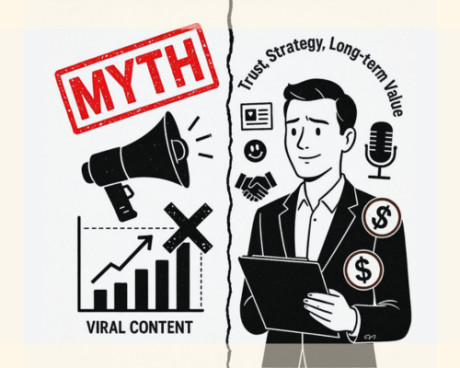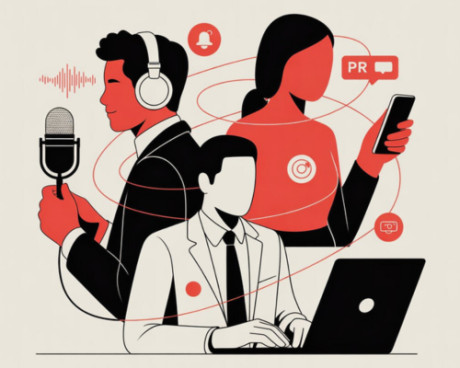

Why startups should avoid influence of AI in their PR efforts
Artificial intelligence (AI) is leading the way in this revolution of technology, which is changing the business landscape at a rate never seen before. AI has impacted many industries, providing cutting-edge answers to enduring problems. The fields of public relations (PR) and automation, predictive analytics, and data analysis have all been significantly impacted by AI. Though AI in PR has a strong attraction, startups need to be cautious before utilising this technology to its full potential.
The
Need for Authenticity
Unlike well-established organisations, startups are still developing their brand identity. Authenticity now becomes essential to successful public relations. Being genuine in communication builds trust, and companies trying to find their place in a cutthroat industry need trust. A 2019 Stackla study found that 86% of consumers consider authenticity to be significant when choosing which brands to enjoy and support. Despite its advances, AI frequently fails to capture the core of human emotions and experiences. While algorithms are capable of creating material and identifying trends, they are not as sophisticated or empathetic as human communicators. Genuine human encounters mixed with authentic narrative have a deeper emotional impact on viewers and foster the growth of a devoted clientele.
The
Danger of Not Aligning with Basic Principles
Startups are usually distinguished from more established companies by their own missions, visions, and values. These principles represent the foundation of the startup's identity rather than merely fancy corporate speak. If AI-driven PR tactics are not closely monitored, they may result in content that is at odds with these fundamental principles. This mismatch has the potential to weaken the startup's brand identity and cause misunderstanding among the target audience. Attempts to build a unique and trustworthy identity in the market may be thwarted by a public relations campaign that does not accurately represent the startup's genuine values.
Cultural
Sensitivity and Contextual Understanding
Understanding and managing socio-cultural situations is fundamental to public relations. It calls for an acute awareness of contemporary trends, cultural sensitivity, and the capacity to react correctly to shifts in the larger society. Even while AI is good at handling massive amounts of data, it frequently can't understand complex cultural quirks. This restriction may lead to offensive PR campaigns, which could be detrimental to the startup's image. As per the 2020 Edelman Trust Barometer Special Report, a significant majority of 62% believes that brands would be indispensable in helping their country overcome the issues it faces. Conversely, human public relations specialists possess an abundance of contextual knowledge and are adept at crafting communications that effectively connect with a wide range of consumers.
The
Influence of Customised Interaction
Especially for businesses looking to establish a solid rapport with the media, influencers, and customers, personalised engagement is an effective PR tool. While AI can handle communications at scale and automate outreach, it cannot match the richness and warmth of one-on-one relationships.According to a 2018 Accenture survey, 91% of customers are more likely to purchase from brands that make recommendations and offers that are relevant to them. AI is just not able to replace the human touch when it comes to understanding individual preferences, interests, and histories, which is necessary for developing meaningful interactions. Human-driven PR initiatives that strengthen ties and encourage advocacy among target audiences can be very beneficial for startups.
Innovation
and Creativity's Place in the World
At the core of startup culture is innovation. Innovative solutions and game-changing concepts that upend the status quo are what startups live on. AI-driven PR campaigns run the risk of becoming unduly data-driven, which could stifle the kind of imaginative storytelling that engages people. Human PR specialists may help firms stand out by using their creative thinking and storytelling skills to create original narratives. Startups may create PR efforts that are not just data-driven but also highly innovative and unique by valuing human ingenuity.
Empathy
and Emotional Intelligence
Public relations (PR) entails managing connections and emotions in addition to sharing information. Effective PR requires both emotional intelligence and empathy, which help experts handle tricky interpersonal situations and react to disasters with tact. In a 2021 PwC survey, 85% of customers expressed the need for more businesses they could trust with their data. Although AI is good at analysing sentiment data, it is not really emotional intelligence. It lacks the ability to understand and react to the nuances of human emotions like a trained public relations specialist does. The capacity to successfully handle emotional dynamics can be the difference between success and failure for startups, whose brand image is still in flux.
Resource
Allocation and Cost Consequences
Although AI has the ability to save expenses and automate some PR procedures, it also necessitates a large investment in both technology and knowledge. The financial burden of deploying and maintaining sophisticated AI systems might be significant for companies with minimal funding. Furthermore, the benefits of human-driven PR in creating enduring and genuine relationships can outweigh the cost reductions from automation. Startups should carefully assess their return on investment and think about directing their resources towards creative projects and human skills instead of other areas.
Artificial intelligence has amazing potential to improve PR in a number of ways. But, there may be more risks for companies if they rely too much on AI than advantages. Effective PR requires human creativity, cultural sensitivity, personalised connection, authenticity, and other essential elements that AI cannot entirely replace. Startups may forge strong, genuine bonds with their target consumers, create a unique brand identity, and move deftly and compassionately through the complicated terrain of contemporary media by putting a high priority on human-driven PR initiatives. Although AI can be a useful tool in public relations, human skill should still be complemented by AI, not substituted. Startups should emphasise human creativity, judgement, and emotional intelligence while utilising AI's strengths for automation and data analysis. Startups will be able to leverage technology with more effectiveness and resonance if they adopt a balanced strategy that preserves their strategic objectives and core values.
Most Popular Blogs
Newsletter
Categories
About the author
Anubhav Singh: Founder & Managing Director, Bridgers
Anubhav Singh is the Founder and Managing Director of Bridgers, with over 15 years of experience in media relations and strategic corporate communications. He has worked with leading Indian brands across sectors and holds a degree in Mass Communication & Video Production along with an MBA in Marketing. Under his leadership, Bridgers has grown into one of India’s leading PR agencies, known for transparency, innovation, and quality.
Related Articles

How Dating Apps in India Must Pivot PR Strategy in 2026 — Trust, Safety, and Search-Optimized Narrative
28 January 2026
Investor Relations: Role of PR & Communications in Creating an Effective Strategy
07 January 2026
How PR is Transforming with the Emergence of Reels and Social Media
15 December 2025
5 Reasons Why Investor Relations is Important for a Successful IPO
22 September 2025
Transformative Impact: Role of PR agencies in Delhi in reshaping India’s PR landscape in 2025
01 February 2025
Revolutionize Your PR: Strategic Campaigns that Drive Success
19 December 2024
Busting Myths: PR is not a sales machinery nor a tool to make you viral
08 August 2024



